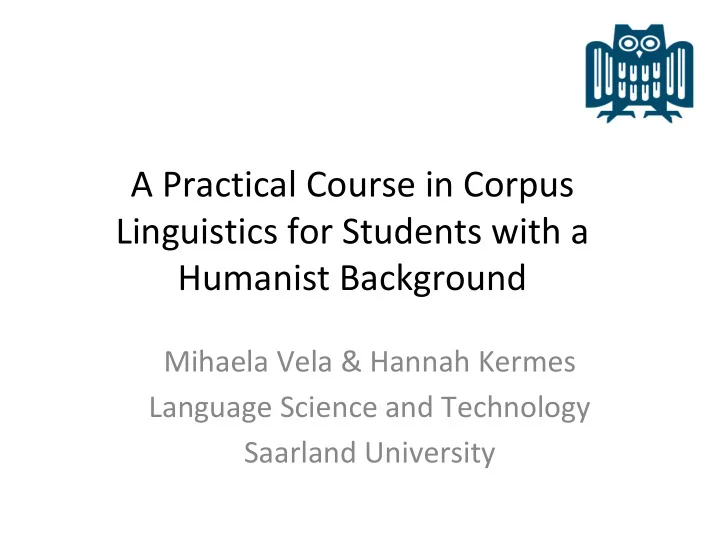

A Practical Course in Corpus Linguistics for Students with a Humanist Background Mihaela Vela & Hannah Kermes Language Science and Technology Saarland University
Overview • Practical course on Corpus Linguistics • BA Language Science – Students with humanist background – Translatology and languages studies – Little or no experience in NLP Vela & Kermes Teach4DH@GSCL2017 2
Challenges • Students – Learning a totally new subject – Dealing with and solving technical problems – Coping with the demands of active learning • Teachers – Motivating students by lowering the psychological and practical barriers – Avoiding or solving technical problems – Dealing with heterogeneous groups – Keeping track of learning success – Adapting to specific needs Vela & Kermes Teach4DH@GSCL2017 3
General Concept • Necessary skills and knowledge for empirical studies • Constructed like a sample study • Tutorials representing single steps • Applicable to different settings and target groups • Active and collaborative learning • Teacher as a moderator and assistant Vela & Kermes Teach4DH@GSCL2017 4
Structure of the Course Vela & Kermes Teach4DH@GSCL2017 5
Method, Tools and Data • Method – Tutorial vs. exercise – Active learning in class vs. self learning – R Markdown – Course material on-line • Tools – TreeTagger (Schmid, 1994) – CQPWeb (Hardie, 2012) – WebLicht (Hinrichs et al., 2010) – Excel/Libre Office – Notepad++ – RStudio • Data – RSC (Kermes et al., 2016) – Brown family (Brown (Francis and Kučera, 1979), Frown (Mair, 1999), etc) Vela & Kermes Teach4DH@GSCL2017 6
Corpus Building • Session 1 – Corpus building with XML and TEI Vela & Kermes Teach4DH@GSCL2017 7
Corpus Annotation • Session 2 – Tagging with the TreeTagger – Part-of-speech tagging of .txt and .xml files Vela & Kermes Teach4DH@GSCL2017 8
Corpus Annotation • Session 3 – Corpus annotation with WebLicht • Additonal annotation layers • Processing chain with at least a tokenizer and the TreeTagger – Tokenization – Lemmatization – Pos-tagging – Parsing Vela & Kermes Teach4DH@GSCL2017 9
Corpus Query • Session 4 – Regular expressions in Notepad++ – Introduction to CQPWeb • Session 5 – Formulating patterns in CQPWeb Vela & Kermes Teach4DH@GSCL2017 10
Corpus Query & Data Analysis • Session 6: – Data extraction and data formats – Manipulating CQPWeb query results Vela & Kermes Teach4DH@GSCL2017 11
Data Analysis • Session 7: Data analysis and data evaluation with Excel – Frequency distribution, normalization and chi- square – Understanding the formulas by using intermediate steps Vela & Kermes Teach4DH@GSCL2017 12
Data Analysis Vela & Kermes Teach4DH@GSCL2017 13
Data Analysis • Session 8: Manipulating data sets with R – Basic notions related to R • Adding column names, adding columns, summarizing the data, merging data sets Vela & Kermes Teach4DH@GSCL2017 14
Data Analysis • Session 9: Normalization and frequency distribution with R Vela & Kermes Teach4DH@GSCL2017 15
Data Analysis • Session 10: Plotting analysis results with R Vela & Kermes Teach4DH@GSCL2017 16
Feedback from Students Vela & Kermes Teach4DH@GSCL2017 17
Feedback from Students Vela & Kermes Teach4DH@GSCL2017 18
Summary • Tutorials for • University courses • Self learning • Reproducible sample study and exercises • Simulation of all steps of a “real” study • Modular basic scripts • Reusable and adaptable to own future study • Active and collaborative learning • Deeper understanding • Problems can be addressed and solved together immediately Vela & Kermes Teach4DH@GSCL2017 19
Link to Website http://fedora.clarin-d.uni- saarland.de/teaching/Corpus_Linguistics/
Recommend
More recommend